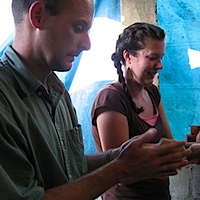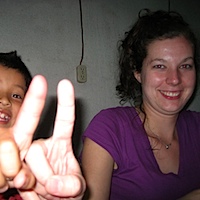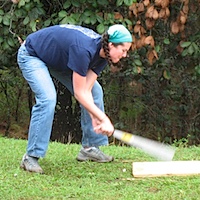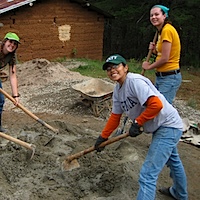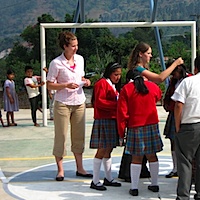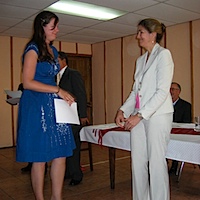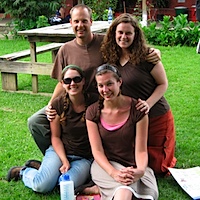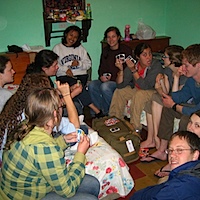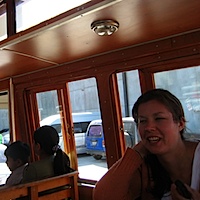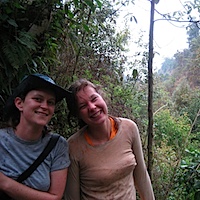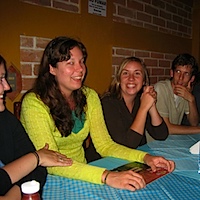I just got home, after a pleasant hourlong walk through the misty green valley I call home. It was kindof late, so I only passed a few Mayans scurrying home after a rainy day of working the fields, but they all said “buenas tardes” and asked me how my wife was doing as I passed. I like hiking, and a pack full of groceries doesn’t weigh much when my mind is on other things. Today, my mind is on Emily Alta.
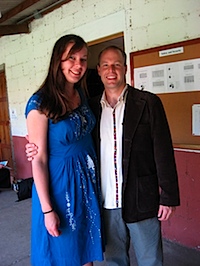 I’ve mentioned my friend Emily Alta before. Her real name is Emily Crawford, and she was the first person I met in the Peace Corps, three minutes after walking into the hotel in Washington DC for staging. She was tall, beautiful, and extremely friendly. When we shipped out to Guatemala, she was assigned the same family as Emily and I for the first three days; then after language assesment, she and I were assigned to the same training town for the next three intense months. During that time, she became my best friend in Guatemala (besides my wife).
I’ve mentioned my friend Emily Alta before. Her real name is Emily Crawford, and she was the first person I met in the Peace Corps, three minutes after walking into the hotel in Washington DC for staging. She was tall, beautiful, and extremely friendly. When we shipped out to Guatemala, she was assigned the same family as Emily and I for the first three days; then after language assesment, she and I were assigned to the same training town for the next three intense months. During that time, she became my best friend in Guatemala (besides my wife).
So why am I thinking about her so much? I just got back form her despedida, or goodbye party. She is throwing in the towel, or “E.T.ing” in Peace Corps lingo (Early Termination). I’m pretty sad about it, actually. Looking at my cellphone, I see that I have more calls with Emily Alta than everyone else put together. How did it come to this? She is a smart, energetic, caring person with a lot to give to her community and the Peace Corps, but I think that explaining why she is leaving will be useful to all of you readers, to better understand some of what happens here in Guatemala.
As I’ve mentioned before, no two Peace Corps experiences are the same. Some things are good, and some are bad. Generally, you enjoy and cultivate the good, and do what you can to mitigate the bad. Luck, however, still plays a significant part. For example, every PCV has a “counterpart,” a Guatemalan national with a job equivalent to yours, and the two of you together form the liason between the US government (Peace Corps) and the Guatemalan government (Ministry of Health). My counterpart, Aurelio, is awesome: he helps us locate interested communities, explains to the villagers why we’re here, collaborates with us on training programs, and is an all-around cool guy. Emily Alta, on the other hand, got a real stinker of a counterpart. Her guy is a womanizer, beats his girlfriend in the health center (he’s married), and has sexually propositioned Emily Alta several times. He has no interest in the Preventive Health program, either; he solicited a Peace Corps volunteer because it looks good on his resume to have one.
Normally, if you get a bad counterpart, your best bet is to find a way to work outside him. Work with other people who DO care about the program (nurses, midwives, etc.), start community action at the ground level, things like that. It’s a lot more work, but sometimes that’s the hand fate deals you. But Emily Alta had a second problem: her community didn’t inderstand why she was there, and didn’t want her. Hardly anyone befriended her, people called her schnoola as she passed in the street, landlords and storekeepers were constantly ripping her off, things like that. Again, this is the opposite of our village, where joyful kids giggle our names from the hilltops and old ladies in the street give us corn because “we’re nice”.
Things kept building up from bad to worse- I heard stories regularly about her counterpart abusing women, sexually harassing Emily Alta, things like that. In March, we had a conference at Peace Corps Headquarters with our counterparts, and hers brought his latest floozie and tried to pass her off as a nurse. Our bosses didn’t buy it and banned his woman from the conference, but he just got annoyed and left early. On they way out, he asked Emily Alta to leave early with him, because he reserved a hotel room with a king size bed in Guatemala City for the night.
By this point, Emily was asking for help from our boss. And this is where it gets confusing. Because of the complicated web of labor unions and government influence, and the political nature of the Peace Corps/ Ministry of Health relationship, he was pretty powerless to get that guy fired. Also, he never really addressed the serious nature of the problem to her satisfaction. Again, this is largely a cultural thing. Sexual harassment is kindof tricky to prove in the US; imagine how hard it is here in a machismo Latin American country, where women are considered second-class citizens? Not going to happen.
Then, a few months ago, it all came to a head. “I’ve been temporarily evacuated from my site,” Emily Alta told me on the phone. “My counterpart tried to rape a woman in the exam room at the health center, and the town has the torches out and they’re setting up a quemado.” In rural Guatemala, they have a tradition called quemado, it’s a sort of vigilante-justice lynching. If someone commits a serious crime, all the townspeople know that the justice system here will never get them (statistically, 98% of criminals in Guatemala never receive punishment). So, they get a big mob together, grab the person responsible, douse them with gasoline, and light them on fire. I am not joking, it really happens here.
Needless to say, the Peace Corps didn’t want a volunteer anywhere NEAR that sort of thing, so they (temporarily) evacuated her. To make it worse, the mayor wanted Emily to testify against her counterpart. Not only would this be a political disaster, but Emily had no desire to have a man’s death on her conscience for the rest of her life, regardless of how bad a person he was. So Peace Corps told her to go spend a few nights at another volunteer’s house.
Slowly but surely, all of this bad stuff built up to the point where she spent every day counting the remaining hours until she could finish her service and go home. “I think about being here a year from now and still not being able to go home, and I feel like crying,” she once told us. This is not a good sign. My Emily (Fanjoy), on the other hand, frets over how she can possibly get everything done in the paltry remaining 13 months we have left, and is amazed at how fast the time is flying by. The difference is night and day. Being here is destroying Emily Alta.
When she told us she was going to go home, we were sad, but not suprised. And the truth of it is, I’d rather she go. Go, and be happy. Life is too short to waste two years of it in misery, and she’s a good person who deserves happiness.
My point in writing this is partly cathartic, but mostly to let you all know that sometimes things here are too terrible to be sustained. Peace Corps is not always a big picnic. And, bear in mind that my story is all an oversimplification… a decision to drastically change your life is brought by a thousand little pushes that could never all be remembered, let alone stuffed into a blog post: the day you came home to find that the mayor unlocked your house and told four migrant workers they could sleep in your living room, or the evening you came home to find that your neighbors broke in and drank your wine, or the morning the construction workers jeered at you as you walked to the outhouse, or the time your landlord charged you double the rent because you’re white, or that room you lived in for months with the ceiling that was too low to stand up and the roof that leaked water onto all your clothes and books, ruining them with mildew. These things and much more happened to her. Singly, each would be just another day in the Peace Corps, something you could laugh about over a beer. Collectively, they show her that Guatemala is not the place for her.
I think the Peace Corps is a great program, as well as a fascinating way to live. If you ask Emily Alta, I am sure she’d agree with that. That’s the thing: she’s not bitter, or going home “defeated”. And I am confident she will go on to do more good things when she gets back to the US. I hope she sends us regular emails.
Here are a picture of a bunch of volunteers (Matt, Ann, Zach, Dan, Ashley) at Emily’s despedida; more than a dozen volunteers from all over Guatemala showed up to wish her the best. That red stuff they are drinking is michelada (Thanks Devin for remembering the name!), a local specialty drink made from beer, tomato juice, chili peppers, lime juice, and salt. I tried it and almost barfed.
If you want to see more about Emily Alta, type “Emily Alta” into the search window at the top right of my blog. There are a lot of entries that include her. Attached to the bottom of this post is a selection of photos of her from throughout her service. She also maintains a blog of her own Peace Corps experiences at: http://meinthepc.blogspot.com/


